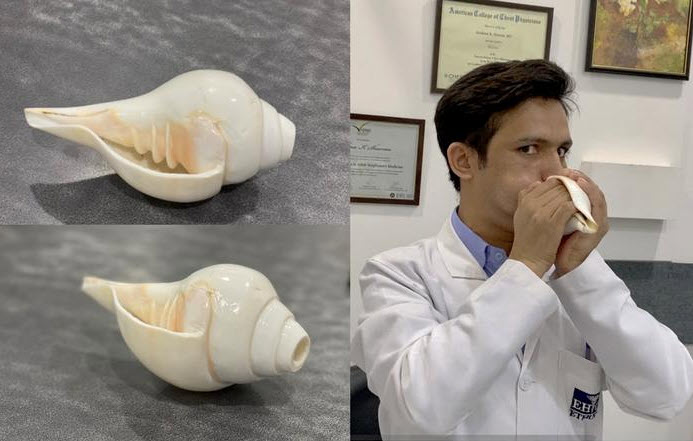Study Finds Conch Shell Blowing Reduces Sleep Apnea Symptoms
Posted on August 12, 2025

A new study found that regularly blowing in a conch shell can help reduce sleep apnea symptoms. The practice of shankh blowing has been part of Indian culture for thousands of years. The new study found adults practicing shankh blowing had fewer nighttime breathing interruptions and felt less sleepy during the day.
Thirty adults in the study were assigned to either shankh blowing or deep-breathing exercises for 15 minutes a day for five days a week. The shankh group reported a 34% drop in daytime sleepiness, four to five fewer apneas per hour, better sleep quality and higher nighttime oxygen levels.
Dr Krishna K Sharma, Eternal Heart Care Centre and Research Institute, Jaipur, India, says in a statement, "For people living with OSA, especially those who find CPAP uncomfortable, unaffordable, or inaccessible, our findings offer a promising alternative. Shankh blowing is a simple, low-cost breathing technique that could help improve sleep and reduce symptoms without the need for machines or medication."
The shankh blowing technique involves a deep inhalation followed by a forceful, sustained exhalation through tightly pursed lips into a conch shell. A larger trial involving several hospitals is being planned.
Dr. Sharma also says, "This is a small study, but we are now planning a larger trial involving several hospitals. This next phase will allow us to validate and expand on our findings in a broader, more diverse population and assess how shankh blowing performs over longer periods. We also want to study how this practice affects airway muscle tone, oxygen levels and sleep in greater detail. We're particularly interested in comparing shankh blowing with standard treatments like CPAP, and in examining its potential help in more severe forms of OSA."
Dr. Sharma is pictured performing the shankh blowing technique in the above photograph. The article was published in the journal, ERJ Open Research.
Image: Krishna K Sharma / ERJ Open Research
